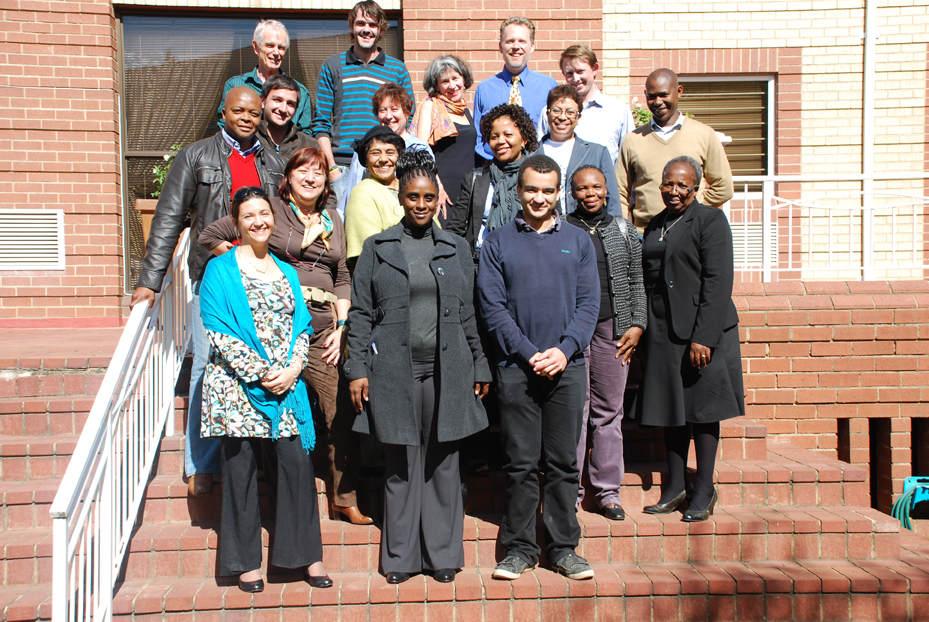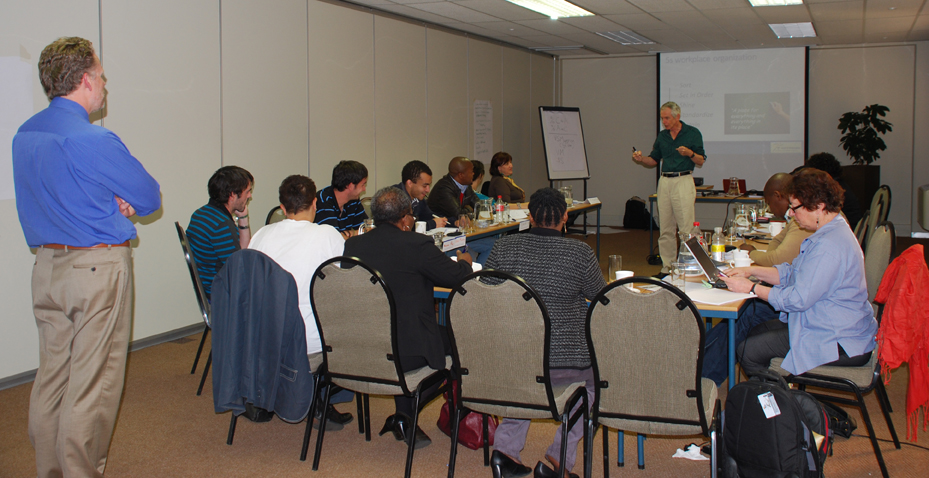Steve Bell is a Shingo Prize-winning author of three books on lean IT. As an LEI faculty member, he supports Lean Global Network members in their mission to expand lean knowledge and practice internationally. Karen Whitley Bell, RN is an author and hospice and palliative care nurse who began her nursing career in the early 90s at the height of the AIDS epidemic. Steve and Karen are the founders of Lean4NGO, an organization and online community that connects lean practitioners with nonprofit leaders. In May 2012, Lean4NGO partnered with Norman Faull of Lean Institute Africa to offer a Lean for Humanitarian Aid Organizations workshop in Johannesburg. Steve and Karen are committed to offering similar workshops in the future with other LGN institutes.
LEI: What is the purpose of Lean4NGO?
Steve Bell: We’re committed to bringing lean principles and practices to the humanitarian sector. Karen and I founded Lean4NGO to create a community that promotes sharing knowledge among lean practitioners and humanitarian aid workers. In this age of increasing need and scarce resources, philanthropic organizations are emphasizing transparency, operational excellence, and improved outcomes. The Lean4NGO mission is to raise awareness among humanitarian organizations about the value and principles of lean practice, while giving practitioners opportunities to provide mentoring and support. In this way, for-profit and nonprofit organizations both benefit through co-learning while making a difference in their community.
 |
| Lean4NGO workshop attendees |
LEI: What was “the work” in this workshop?
Steve: The May workshop in South Africa served as an introduction to lean for humanitarian aid leaders, providing a basic overview of lean principles and practice, with guidance for continuing their learning. Our goal was to help participants understand how fundamental lean principles and practices can help NGO’s become more efficient, effective, and transparent, and to simply take the time to talk, learn, and share with one another.
LEI: What topics did you cover and how did it go?
Steve: We shared an overview of lean principles and some of the lean tools. We shared some real-life examples of lean in action. Norman shared a powerful story from his work at a large hospital in Cape Town. In August and September of last year, he coached a senior physician in the emergency department of the hospital in a handful of lean projects. In one of the projects the physician worked with his colleagues in a classic 5S exercise in the Resuscitation Room, the heart of the Emergency Department. All equipment was reviewed, store rooms were cleared, and essential items were placed for easy access and clearly arranged as to size and purpose.
Then on 24th September, a horrendous shark attack took place off a nearby beach and the critically injured swimmer was brought to the Resuscitation Room by helicopter. The medical team, including Norman’s collaborator, worked furiously to treat the patient. That evening Norman heard from the physician. He said they treated the shark victim that day and no one needed to leave the Resus Room to fetch anything during the process. Clearly, the 5S exercise had contributed to speedy and effective, and ultimately life-saving, treatment.
Karen: One of the more significant discussions in the workshop focused on how participants might use lean to address larger, systemic supply chain issues beyond their control. In South Africa medications are frequently unavailable. They aren’t affordable or sometimes they are diverted by unethical or unlawful practices. An organization might make gains in efficiency at a pharmacy, but without a consistent supply of affordable medications, these gains don’t add real value to the people served. While there are no easy answers to issues of resource shortages and larger social issues, improving relationships with partners, including donors and affiliate organizations, can play a role in creating greater transparency as well as an environment of greater accountability.
Steve: Throughout the day there was an energy, excitement, and thirst to learn more. Participants actively engaged with each other during the workshop and during breaks. They discussed common issues and brainstormed about how they might apply lean principles to address process-related challenges and gain buy-in from colleagues. They discussed the benefits of lean and plans for the future. They spoke about specific benefits they expected to see in service delivery through particular process improvements. I recall several participants saying they wished more of their colleagues had been able to attend.
LEI: Who attended the workshop and why did they come? What are the major challenges attendees face at work and in this region?
Steve: Twenty-two people participated. One participant worked in sustainable agriculture. The rest worked in healthcare, primarily serving people affected by HIV/AIDS.
Folks who work in these nonprofits are mission driven and have plenty of enthusiasm, but often their efforts are hampered by basic inefficiencies and resource shortages. All participants are deeply committed to improving the value of their services to their communities, and to discovering new ways to do more with less. These concepts are what drew them to the workshop. The biggest challenges they face are lack of resources and inconsistent supply chains.
Karen: Another challenge relates to the question of “who is the customer?” While the end customer is the patient and family, in South Africa—and frankly, pretty much everywhere—much of how healthcare is delivered is structured by the funding source. I listened as participants discussed how donor requirements, what got measured and what ensured future funding, didn’t align with what was needed or what would create real, positive impact in communities. We talked about ways to involve funding partners more closely in creating targets that better aligned with end customer needs.
We also learned about how AIDS has left many communities decimated. They’ve lost a lot of their adult worker and parenting populations and have growing numbers of orphans. As a result, many communities are crippled economically and are struggling to provide more services amidst growing needs.
LEI: What do you believe is the opportunity for lean in the nonprofit and humanitarian aid sectors, for lean in South Africa and the larger region?
Karen: More than 50% of the world’s population lives on less than $2 per day. Every day, more than 22,000 children die from poverty-related, preventable causes. In the humanitarian aid sector, lean concepts can be applied in two ways: to improve the efficiency and value of services delivered, and less obviously, as a model for those being served. Many of the world’s poor are self-employed. Imagine the experience of an impoverished woman who visits a clinic that practices lean. She may see visual management tools that show how the work flows. She may notice how everyone knows exactly where everything is, how no one takes time to hunt for supplies. She may reflect on how well and quickly her needs were met, how she seemed to flow through the system, where nothing seemed like a waste of her or anyone else’s time. She may very well leave that clinic thinking about how she can put those same practices to work in her small enterprise.
Whether in South Africa, the African continent, Asia, Central, South and North America, lean can add value anywhere, in any sector. In the humanitarian aid sector, the value we’re talking about involves saving lives and creating better outcomes and new kinds of opportunities for people.
Steve: There is such a great need to be more effective in humanitarian service, including disaster response and community development. Progress towards the United Nations Millennium Development Goals can be enhanced through lean thinking.
To Karen’s point, lean practice by humanitarian organizations not only improves the value the organization delivers, it can also serve as a model for the people served, and that too improves outcomes, both at the individual level and the community level. For example, in my years of experience volunteering with micro-finance and micro-enterprises, I’ve found that lean applies directly. With microcredit, a poor but highly motivated woman can receive a loan for a very small amount of money and some coaching to start her own small business. Decades of research has shown that in most cases, these women reinvest their earnings in their families, sending their children to school and providing better nutrition. Also, using the skills and confidence gained, these women often become leaders within their communities, improving the lives of other women and children and the community as a whole.
In my mind, all micro-enterprises are lean startups. Purpose, process, and people! Learning and empowerment. It’s very powerful when you consider how lean thinking can help those living at the bottom of the economic pyramid to help themselves.
LEI: Where are workshop participants focusing their attention and energies now? What new learning do you believe participants left the workshop with?
Steve: While we offered some exposure to lean tools (5S, VSM, etc.), perhaps the most significant learning involved lean leadership principles, when attendees began to recognize the unused potential within their own organizations. In South African culture, “command and control” is prevalent; often people are told what to do. As we talked, attendees began to understand the opportunity of engaged human potential. What could happen if the people doing the actual work had the chance to voice their ideas and improve the work? They said they wanted to lead more like coaches, encouraging team members to become more active participants in experimenting and problem-solving.
Often it comes down to the lean philosophy of respect for people, teamwork, and problem-solving. Several participants expressed an intention to change their approach to leading and managing employees, creating more opportunities for people to solve their own problems rather than telling them what they think they should do.

South African Affiliate Founder Norman Faull explains lean concepts.
LEI: What has been most rewarding for you personally about this particular learning activity?
Karen: For me, the most rewarding aspect of this workshop was the opportunity to talk with and learn from so many dedicated, passionate people working for positive change. While we were not able to visit sites on this trip, we were able to listen as participants described their work and their challenges. This deepened our understanding and allows us to better target our efforts to improve the value to those we serve through Lean4NGO, as well as through our other volunteer work with micro-finance organizations. This work connects us in a direct and meaningful way with our neighbors in this global communities.
LEI: What’s next for you and Lean4NGO?
Steve: We are working with LEI to create mentoring and learning opportunities among lean practitioners in Africa. Karen and I continue to coach and support one major humanitarian aid lean initiative per year. This year, we’re honored to work with the Nobel Peace Prize nominated organization, Mercy Corps International. Karen and I are also available to offer this workshop, pro bono, in partnership with any of the LGN partners or other lean practitioners around the globe. We look forward to exploring more collaborations with Norman Faull and his team at Lean Institute Africa.
We invite anyone interested in learning more to visit Lean4NGO.org, join the LinkedIn group, enter the conversation, and get engaged in your community. Take the time to tell your stories, so others can learn with you. We are convinced that every lean practitioner, no matter their experience level, has something to share and something to learn.
Links with relevant information:



